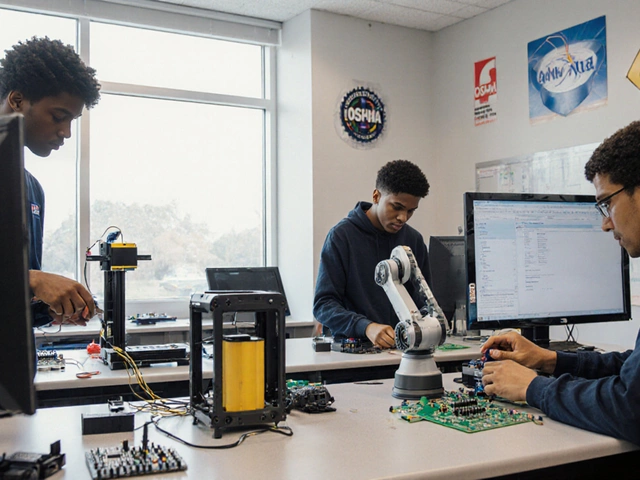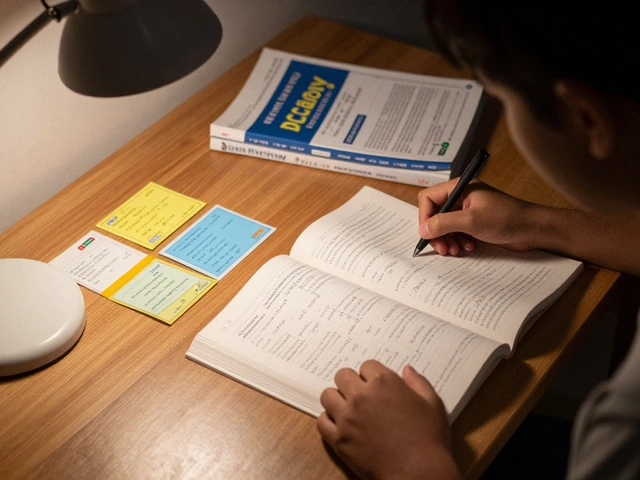Hey, ever noticed how often you're swept into a race without even realizing it? Whether it's in a classroom, at work, or hanging out with friends, the urge to compete can feel almost automatic. Some say it's just part of being human. But why are we naturally inclined to compete?
One idea is that this drive has roots deep in our evolution. Competition might have been that push our ancestors needed to snag the best resources, find mates, and ultimately survive. In today's world, it looks a bit different. It’s less about outrunning a predator and more about acing a test or snagging a promotion. But that competitive spirit? Still going strong.
On the flip side, it's not just about nature. Nurture has a hefty role to play too. Think about how kids are encouraged to do their best in school or sports. Schools dole out graded marks like gold stars, subtly nudging kids towards that competitive edge. It's everywhere, shaping how we approach tasks and challenges in our lives.
- The Drive Behind Competition
- Nature vs. Nurture
- Competition's Role in Society
- Mastering Competitive Exams
- Finding Balance in a Competitive World
The Drive Behind Competition
So, what fuels our urge to outdo and outperform? The competitive spirit doesn't just pop up randomly—there's some real science behind it. For starters, a chunk of this drive is hardwired. Evolutionary psychologists suggest that our ancestors needed to be competitive to survive in harsh environments. Securing food, shelters, and partners once meant out-competing others in their group. Those who succeeded passed on their genes, making this competitive drive a part of human nature over generations.
Now, it's not all about old stone-age behaviors. Our brains are a bit like competition engines, powered by dopamine. Each time you snag a win or achieve a goal, dopamine floods your brain, making you feel all kinds of awesome. It’s like your brain saying, "Nice job, keep it up!" This chemical reward system reinforces our desire to chase the feeling over and over. Pretty neat, right?
But let’s not ignore society's role here. From a young age, we’re often tossed into competitive situations—think school grades, sports events, even sibling rivalries. Society places value on winning, and we start feeling that drive early. The education system, with its emphasis on tests and grades, cranks this up even further.
Did you know some research has linked competitiveness with other positive traits like ambition and motivation? It's not all about survival of the fittest. There’s evidence that a healthy dose of competition can foster innovation and improve skills. People can thrive when they’re pushed to do their best, meeting challenges head-on.
That’s not to say competition doesn’t have its downsides. There are times when it spirals out of control, becoming stressful or leading to unhealthy behaviors. Balancing that natural drive with collaborative instincts is crucial. It’s about finding that sweet spot where the competitive edge fuels productivity without overpowering well-being.
Nature vs. Nurture
Alright, let's dive into the whole nature vs. nurture debate. This one’s been around forever, especially when it comes to understanding if we’re naturally competitive or we've just picked it up along the way.
First up, nature. When we talk about nature, we're looking at all those genetic and biological bits and pieces you’re born with. Evolutionary psychology suggests that humans have an innate drive to compete. Why? Well, back in our caveman days, competition for food, mates, and territory wasn't just a good weekend plan—it was essential for survival. Stronger traits prevailed and those who were better at competing survived. It’s like survival of the fittest on steroids.
Now, let’s shift to nurture. This one's all about the environment you grow up in, the society you’re part of, and how you’re raised. Ever noticed how parents rave about their kid's first step or first word like it’s a Nobel Prize? Those little nudges start pretty early. Schools give out grades and trophies, sparking a competitive spirit among kiddos. Plus, look around—society rewards winners. Whether it’s getting that shiny employee of the month plaque or being the class valedictorian, it's clear that the environment amplifies that natural competitive streak.
So, is it more nature or nurture? Truth is, it's a bit of both. Researchers often agree that you can't pin it all on one side. Genetics might light the spark, but the environment fuels the fire.
Here’s a fun fact: Studies show that identical twins, even when raised apart, demonstrate similar levels of competitiveness. Wild, right? Yet, they also display unique competitive angles depending on upbringing, proving just how intertwined nature and nurture are.
In the end, understanding this balance helps us figure out how to better prepare for competitive exams or challenges. Know what drives you, use it to your advantage, and play the competitive game smartly.

Competition's Role in Society
It's no surprise that competition is everywhere in our lives. It fuels innovation, keeps businesses on their toes, and even spices up our social interactions. But how exactly does it fit into the bigger picture of society?
First off, competition is a big driver of economic growth. When companies vie for consumer attention, they end up pushing boundaries. This means better products, innovative services, and sometimes even lower prices for you and me. Think about how smartphone companies are always trying to one-up each other with newer models!
In education, competition ramps up the stakes too. Schools and universities often use it as a tool to motivate students. Competitive exams, for instance, aren't just about testing knowledge. They often set the stage for future opportunities — like getting into a dream college or landing a coveted scholarship.
Then there's the social aspect. Humans are kind of wired to compete, and this extends to how we engage with one another. Whether it's besting a friend in a board game or racing your cousin to the finish line at your local run, these interactions strengthen bonds and foster personal growth.
However, we can't overlook that competition sometimes turns intense, leading to stress or unhealthy rivalries. So, society benefits, but there's a catch: individuals need to balance the drive to compete with the need for cooperation and empathy.
All in all, competition molds society in more ways than one, influencing everything from economies to personal relationships. It's a force that's both powerful and complex, full of challenges and rewards.
Mastering Competitive Exams
Feeling the heat from those competitive exams? You're not alone. Many students are in the same boat, wondering how to navigate these high-stakes tests. But don't sweat it, there's a strategy to it.
First up, it's crucial to understand the format and pattern of the exam. Take a close look at past papers. Noticed a trend? Many exams recycle question patterns or types, so getting familiar with them gives you an edge.
Next, time management is your best bud. Creating a daily study plan helps. Break down your syllabus into chunks and set goals. This isn't about cramming everything in one go—it's about little steps every day.
Practice, practice, and yes, more practice. Tackle mock tests and time yourself. It's like gearing up for a race; the more you train, the better you'll perform on the actual day. Plus, when exam day comes, it won't feel like a surprise attack.
An important piece of advice from renowned educator Salman Khan:
"Master the principles and you won't stumble on the problems."This means don't just memorize, understand. When you grasp the basics, solving random or tricky questions becomes much easier.
- Stay healthy: Eat right, sleep well, and take breaks. Your brain is a muscle, treat it kindly.
- Avoid distractions: Social media can wait. Set dedicated study times without any digital distractions.
- Seek help when needed: Don’t hesitate to reach out to teachers or peers if you’re stuck. There’s no trophy for struggling alone.
Lastly, mindset matters. Believe you can crack the exam. Stress can sabotage the best efforts, so keeping calm really is key. Some folks even like to meditate or do a quick workout to keep those stress levels in check.
By following these steps, you're setting yourself up for success, not just in exams but in any challenge that comes your way.

Finding Balance in a Competitive World
Let's face it, diving headfirst into a sea of competition can sometimes feel like an endless marathon. Even when it’s just about beating your own personal best, the pressure can be real. So, how do you find that sweet spot between giving it your all and not burning out?
First off, know your limits. Overloading yourself with too many competitive exams, tasks, or goals can lead to stress and burnout. Make a list of priorities and focus on a few key objectives at a time. This way, you’ll conserve energy for what truly matters.
Next up, surround yourself with positivity. Engage with peers who lift you up rather than putting you down. A supportive environment is crucial. Think of this as creating a personal cheerleading squad that helps you stay motivated and less anxious.
Practicing mindfulness is another ace up your sleeve. Take time daily to breathe and relax, even if it’s just for a few minutes. Meditation and deep-breathing exercises can do wonders in keeping stress at bay. Remember, a clear head leads to better performance.
Here's a quick breakdown of how stress relief could boost your results:
| Activity | Reduction in Stress (%) | Improvement in Performance (%) |
|---|---|---|
| Meditation | 30 | 20 |
| Regular Exercise | 25 | 15 |
Finally, remember to enjoy the journey. It's easy to get lost in the destination, but appreciating the baby steps you take every day can be equally fulfilling. Celebrate small wins! It's these moments that fuel your passion and keep you from getting bogged down by the weight of it all.
By keeping these tips in mind, you can strike a balance that lets you shine in a competitive world while keeping your sanity intact.










0 Comments